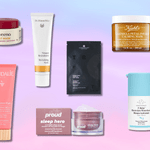Do Hyaluronic Acid Supplements Really Work? Here’s What Dermatologists Say

Hyaluronic acid face serums are touted for reducing fine lines and wrinkles. Can hyaluronic acid supplements deliver the same benefits?
Dry skin is no picnic. (Or it’s like a picnic in the desert in the middle of a heat wave.) It can redden, itch, flake, and make fine lines and wrinkles all the more apparent. If your skin is dry enough, even the richest of moisturizers can fail to hydrate. That sound like you? It may be time to add hyaluronic acid to your daily skin care routine.
This powerhouse hydrator—it can counter dryness and leave skin smooth and plump—comes in a few forms: topical (think serums and creams), injectable dermal fillers, and oral supplements.We know these injectables can plump skin. And we know that, when used properly (not on dry skin!), hyaluronic acid in serums and creams can help reduce the appearance of fine lines and wrinkles. (It’s typically used alongside moisturizers—when applied to dry skin it could pull moisture from the skin.)But what’s the consensus on the other popular form of hyaluronic acid: oral supplements?
Some say they can hydrate your skin from the inside out. Is it all just hype, or is there some concrete science behind hyaluronic acid supplements? We spoke with dermatologists to get the lowdown on whether ingesting hyaluronic acid will give you the same benefits as slathering it on your skin. Here’s what they had to say.
(Related: Niacinamide and Your Skin: Benefits—Plus Expert Tips on Using It)
What is hyaluronic acid?
For an ingredient with some pretty cool superpowers, hyaluronic acid is a simple little guy.”Hyaluronic acid is a sugar molecule that is naturally occurring in skin and other types of human tissue,” says Nancy Samolitis, MD, a board-certified dermatologist and owner of Facile Dermatology and Boutique in West Hollywood, California.
Half of the hyaluronic acid in the body is found in the skin, which is why it’s such a hugely popular ingredient in skin care. However, its hydrating powers aren’t confined to the dermis, the second, deeper layer of skin.”Hyaluronic acid is found in those areas of our body that need moisture and lubrication to function,” explains Flora Waples, MD, medical director of Restor Medical Spa in Denver. So you’ll find it in your joints too.
Though your body makes the stuff naturally, the amount in your body decreases with age. You may have already noticed the moisture loss that happens as we get older. The result: dry skin. That’s when people turn to hyaluronic acid, in the form of topical products, oral supplements, or injected dermal fillers. “In its synthetic forms, such as dermal fillers, it essentially does the same [as naturally produced hyaluronic acid],” says Jennifer M. Segal, MD, a board-certified dermatologist and founder of Metropolitan Dermatology Institute in Houston.
(Related: Is Goat Milk Soap Good for Your Skin?)
Topical hyaluronic acid for dry, aging skin
Certain skin care ingredients become the trend du jour only to fade from the spotlight when the industry collectively moves onto the next big thing. Not so for hyaluronic acid: it’s enduringly popular because it works. “It has a jelly-like texture and holds over 1,000 times its weight in water, therefore creating plumpness and hydration in the skin,” explains Dr. Samolitis. You can think of hyaluronic acid like a magnet, attracting water and pulling the moisture into the skin.
Worried that it’s going to be harsh on your skin? Don’t fret. It may have “acid” in its name, but it acts as a skin hydrator (something called a humectant), not an exfoliator. And because it’s naturally occurring in the body, it’s well-tolerated and can be extremely effective at making that dry skin dewier and plumper. You can use it daily, either on top of damp skin and beneath a moisturizer or in moisturizer form.
What are hyaluronic acid supplements?
While topical hyaluronic acid—the creams, lotions, and serums you can apply to your face—are popular, they’re not the only hyaluronic acid products you’ll find on store shelves. Oral supplements are popping up all over the place too. Hyaluronic acid supplements are no longer a fringe phenomenon: they’re so run-of-the-mill, in fact, that you’ll find them on the shelves of many grocery stores and pharmacies. The supplements are designed to be taken orally in capsule form, sometimes up to twice per day. There’s no standard dosage, although 120 milligrams is common.
Whatever the brand, Kelly Bickle, MD, a dermatologist in Santa Monica, California, believes hyaluronic acid can have positive skin care results when taken as a supplement. According to Bickle, hyaluronic acid supplements have the potential to boost hydration and reduce the appearance of wrinkles. As a result, they might lead to a more youthful appearance.
(Related: Does Dry Brushing Really Make Your Skin Healthier?)
What the science says about hyaluronic acid supplements
Oral supplements of hyaluronic acid seem almost too good to be true, but there is some scientific evidence backing them—at least when it comes to alleviating knee pain. But when it comes to their potential to hydrate skin, there’s more anecdotal evidence than research. Few studies have directly linked skin hydration with supplemental hyaluronic acid. That doesn’t mean the supplements are bunk. They’re just most useful for something other than plumping skin. Studies exploring the link between hyaluronic acid supplements and knee pain show a promising correlation. One study published in Scientific World Journal found that 200 milligrams of hyaluronic acid taken orally once a day for a year helped improve the symptoms of knee osteoarthritis in people younger than 70. This effect was true when done in conjunction with quad strengthening exercises, a common treatment for knee pain. It’s tough to know whether the supplements lessened arthritis symptoms though; it’s possible the exercise played the biggest role.
Meanwhile, a 2016 article in Nutrition Journal, which reviewed multiple hyaluronic acid trials between 2008 and 2015, observed that studies “clearly suggest hyaluronic acid is absorbed by the body.” Furthermore, the studies also showed that the supplement may help reduce pain in the knee. But the researchers noted that more research is needed to understand how the supplement works in the body. The study concluded that oral hyaluronic acid shows mild effectiveness with no side effects. In other words, supplementing with hyaluronic acid doesn’t pose any immediate risk.
But will it do you any good? It’s possible—if you have knee osteoarthritis. As for its skin-moisturizing effect, without solid research, it remains an unknown.
(Related: Should You Choose Vegan Skin Care Products? Here’s What You Should Know)
Which is type of hyaluronic acid is best?
If you’re looking for the best results from your hyaluronic acid, which is worth the cash: topical or oral? For Dr. Segal, the answer is neither. “Injected is best” she says. Popular hyaluronic acid injectables include Juvederm, Restylane, and Voluma, although there are many on the market. Each works roughly the same. They’re injected into the skin, leading to plumping effects that last somewhere between six months and two years. Regardless of which filler you choose, discuss potential side effects with your doctor first.
Marisa Garshick, MD, a board-certified dermatologist with MDCS Dermatology in New York City, notes that all fillers could come with potential side effects, including bruising and swelling. In rare instances, there’s a risk of blood vessel occlusion, which is a blockage of a blood vessel. These might offer the biggest effect, but if you’re not interested in injections, Dr. Segal suggests choosing topical hyaluronic acid. The recommendation stands, no matter what type of skin you have.
“Hyaluronic acid is well tolerated by most because it’s a hydrator,” says Michelle Henry, MD, clinical instructor of dermatology at Weill Cornell Medical College and founder of Skin and Aesthetics Surgery of Manhattan. “If someone is very oily, hyaluronic acid can be used alone.” You’ll notice none of the docs recommended oral hyaluronic acid supplements. There’s just too little proof they do more than drain your bank account.
(Related: The Best Sleeping Facial Masks for Brighter, Smoother Skin)
Risks and side effects
Although hyaluronic acid naturally occurs in the skin, allergic reactions can occur, says Dr. Segal. But that’s more common with injectable hyaluronic acid. Side effects are much rarer with topical and oral forms. “Hyaluronic acid is largely an inert substance,” says Dr. Segal. If reactions occur at all, they might have to do with the other ingredients in the product.
As with any supplement, picking a reputable brand is key. They’re not regulated by the Food and Drug Administration the way drugs are, which means you can never be quite sure you’re not unknowingly ingesting toxins. The best way to protect yourself is to choose a product that has third-party testing. And don’t believe everything you read on the label. There’s no regulation there either, so a supplement doesn’t necessarily do what it claims.
In the case of hyaluronic acid supplements, there’s little proof they’ll actually hydrate your skin, make it more plump, or reduce the appearance of wrinkles. Save your money for a hyaluronic acid serum or cream, or a hyaluronic acid filler.
Now that you know about hyaluronic acid supplements, find out if psychodermatology is the key to healthy skin.




